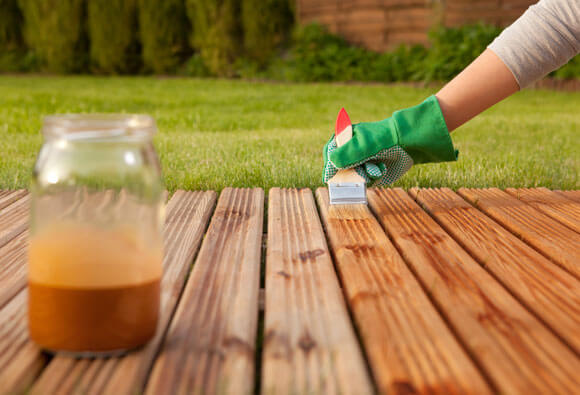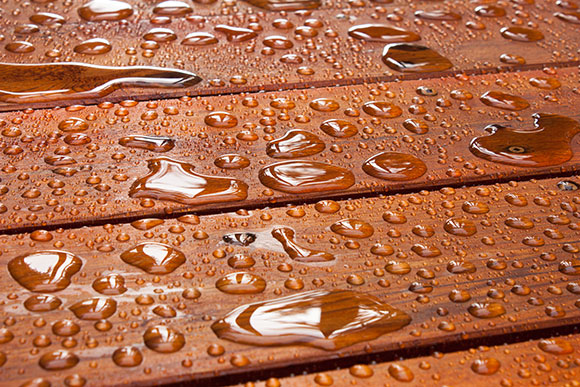Garden decking can cost hundreds or even thousands to install so it makes sense to protect and preserve it. But which decking oil is best? Decking oils are designed to nourish and protect wooden decks from weathering, splitting, warping, foot traffic, stains, dirt, and more. Deciding which oil-based decking treatment is best for your decking can depend on a range of factors. Our decking guide is here to help you decide which decking treatment is best, to keep garden decks protected and looking great, all-year-round.

Easily applied decking oil to protect and preserve garden decking
Types of Decking – Softwood and Hardwood
Softwood decking is usually made from Pine, Larch, Fir, or Spruce. These fast growing, evergreen, or coniferous trees produce highly durable timbers, that are perfect for softwood decking boards. These timbers require oiling to help protect the timber against weathering, and water ingress. Hardwood decking is naturally more resistant to weathering, mould, algae, and wood rot, but should still be oiled to waterproof and protect it from long-term weather damage and other biological threats.
To keep softwood decking in tip-top condition it is recommended that after an initial application of 2 thin coats to new or untreated decking, a thin maintenance coat of decking oil is applied 2 or 3 times a year. The best time to do this is in Spring and Autumn, in dryer, warmer conditions, so that the oil can penetrate into the decking timbers. Hardwood decking generally requires less maintainance but will still require a thin maintainance coat from time to time.
Which is the Best Decking Oil?
Choosing the right decking finish, and the one that best meets your needs, can depend on the type of decking you have. Factors such as the wood type, age, condition, and the desired finish can all have an influence on which type of decking treatment to use.
In addition to protecting your deck from weathering and foot traffic, oil-based decking treatments come in a variety of types including clear, natural, and colour tinted shades, also known as oil-based decking stains or coloured decking oils. Additional properties can include UV filters to protect the wood from sun damage and colour fade, anti-slip properties for better grip, ideal for decking steps, and mould inhibitors or biocides to help prevent the growth of mould and algae, which can make decking boards slippery.
Why use oil-based decking treatments on decking?
Oil-based decking treatments work by penetrating into the decking timbers, where they dry, oxidise, and harden within the wood grain of the timber. This forms a tough, durable, water, and weatherproof barrier that beads rain and allows water to run-off. This helps to prevent water ingress that can lead to mould and algae, which in turn can become slippery and promote wood rot.
Key benefits of decking oil treatments
- Reduced cracking, splitting, and warping of the decking boards by keeping them nourished and supple
- Reduces dirt and grime from foot traffic becoming embedded in the grain of the deck
- Some decking oils provide protection from the bleaching effects of the suns UV rays with fade resistant pigments and UV filters
- Anti-slip decking oils provide slip resistance to help keep decking safer, even when damp or wet. Perfect for busy decks and especially decking steps
- Coloured decking oil or oil-based decking stain can restore the look of old decking boards that have turned grey or silver. They can also be used to simply change the appearance of new decking boards by staining them to a different colour
Clear decking oils
Clear decking treatments are designed to nourish and protect decking boards whilst retaining the natural character of the timber. Clear products tend to give wooden decks a slightly darker, almost damp like appearance, whilst enhancing the natural grain and character of the timber. To get an indication of how decking will look when oiled, simply wipe over a section of untreated decking with a slightly damp sponge.
Top 5 clear decking oil treatments
- Ronseal Decking Oil Natural (Clear): The original, all-in-one, solvent-based oil for all bare wood, preserved or pressure treated softwood and hardwood decking. Contains UV filters to protect decks against sun damage. The formula is also designed to help prevent mould, mildew, and fungi growth
- Ronseal Ultimate Protection Decking Oil Natural (Clear): A water-based formula for all bare wood decking. Offers up to twice the resistance of standard oils with excellent water repellent properties and rainproof in just 90 minutes. Contains UV filters to protect decking from sun damage and colour fade
- Barrettine Nourish and Protect Clear Decking Oil: An advanced-formulation solvent-based oil that nourishes and protects decking and other garden wood. Contains a biocide preserver to protect against mould and added UV fade resistant pigments to protect decking from the sun’s damaging UV rays
- Cuprinol UV Guard Decking Oil: A water-based wood oil with a lightly tinted formula that revitalises the colour of weathered decking boards
- Osmo Decking Oil: A highly refined oil that is especially suited to dense, exotic, hardwood decking such as Ipe, Yellow Balau, Massaranduba Cumaru, Iroko, Merbau, Teak, and other tight grain wood species. Because of its very thin consistency, it is more able to penetrate into the tight, dense grain of exotic hardwoods used to make high end decking boards
UV Protection for decking
Although many clear deck oils contain UV filters to help protect the deck from the greying effects of UV exposure, not all do. UV filters work much like suntan creams by filtering out and protecting wood from harmful UV rays. Although they help to filter UV rays, they do not stop them. This means that decked areas will naturally grey over time, albeit at a much slower rate than decking treated with a non-UV resistant decking treatment.
Pigmented or Colour Decking Oils
Using a coloured decking oil or oil-based decking stain is a great way of changing or restoring the appearance and character of decking. Available in a range of colours, oil-based decking stains are a great way to restore the appearance of old, tired, and grey looking decking. Coloured decking treatments offer better UV resistance against sun damage because of the colour pigments suspended in the oil. As a rule, the darker the colour, the more UV resistance the oil provides. As an example, an Oak or Cedar coloured oil will provide better UV protection than a clear or natural oil.
Available in both clear and coloured formulations, the following oil treatments are suitable for both softwood and hardwood decking.
Top 5 Coloured Decking Oils to Stain Decking
Pigmented or coloured decking oil treatments both colour and protect wooden decks. They work the same as clear oils by being absorbed in to the decking timbers. The colour pigments in the oil stain the wood to change the appearance of new and old decks.
- Ronseal Decking Oil: A long established and proven decking treatment that offers excellent value for money and available in a range of attractive tinted colour shades including Natural Oak, Natural Cedar, and Natural Pine
- Manns Premier UV Decking Oil: A multi-purpose exterior decking treatment. Unique UV formula resists the greying effects of the sun. Available in a range of popular colour tinted finishes
- Osmo Oil for Decking: A German manufactured, premium grade deck oil suitable for all softwood and hardwood decking. Available in a wide range of attractive colour tones that stain and protect garden decking
- Barrettine Decking Oil: An advanced formula that nourishes, protects, and stains wooden decking. Comes in several colours to stain, enhance and protect garden decks
- Liberon Decking Oil: Protects, nourishes, and enhances the natural beauty of most timber decking. Perfect for reviving and restoring colour to old and new decking. Containing UV filters to helps reduce discoloration and fading from the sun, whilst maintaining the finish. Available in clear, medium oak, and teak

Choose from a wide range of colour decking oil options that stain, colour, and protect decking
Anti slip decking oil
Slip-resistant or anti-slip decking oils contain small particles that bond with the decking surface to create a microscopic textured layer. These oils are perfect for raised decks with steps and especially ideal for commercial premises such as pubs, restaurants, garden centres and clubs, where safety is a top priority.
Although too small to see, the dried oil provides improved friction and grip between feet, shoes, and the surface of the deck.
Recommended anti-slip decking treatments
Anti-slip decking oils are usually only available in ‘clear’ formulations. They are designed to be used as a top-coat over an existing clear or coloured decking oil once it has dried, to provide an anti-slip or slip resistant finish.
- Barrettine Anti-Slip Decking Oil: A premium quality anti-slip deck oil for use on all types of wooden decking and garden steps
- Osmo Anti-Slip Decking Oil: A high quality, anti-slip decking treatment for all garden decking. Perfect for decking steps and decking situated in commercial areas such as pubs and restaurants

Rain beads on the surface of oiled hardwood decking
Which is the best decking oil?
Deciding which is the best decking oil largely depends on the individual project, and the desired look and performance expectations. Some factors are straight forward such as whether to buy a clear oil to enhance the natural colour of the deck or a colour tinted oil, to stain the deck for a specific look. Other factors to take into consideration are UV resistance, protection against mould and algae, and anti-slip properties.
When choosing a decking treatment, research each product to make sure that it meets your project requirements in terms of colour, price, coverage, and application. Read independent customer opinions to get an indication of durability, value for money, and any other points that will help you to make an informed decision before buying.
Whilst softwood decking can be oiled from new, new hardwood decking often needs to be allowed to weather for a time before applying a decking treatment. Dense exotic hardwoods are naturally oily and have a tight grain. If an oil is applied too soon, it may not penetrate in to the decking timbers, resulting in a sticky or tacky film on the surface of the wood. Allowing hardwood decking to weather for a time allows some of the natural wood oils to dissipate and for the grain to open.
Always read the instructions from the decking supplier as the ‘weathering’ period can vary depending on the type of decking and the species of wood used to make the boards. Once the grain opens, the boards will more readily accept the oil. Some types of exotic hardwood timber such as Ipe, Yellow Balau, Massaranduba Cumaru, Iroko, Merbau, and Teak may require a highly refined or extra thin oil such as Osmo Decking Oil for the best results.
Research before you buy
Before buying any decking treatment, we always recommend that you do some quick research to see what other customers think about colour, how well the product performs, and their ‘value for money’ opinion. Buying cheap decking oils could be a false economy as well-established brands are more likely to perform better, and last longer.
How and when to apply decking treatments
Applying an oil to new, bare wood decking is quick and easy. Simply follow a few simple rules and your new garden decking will look amazing in no time.
- Sweep with a stiff broom to remove any lose leaves and other surface debris
- Ensure that the decking is clean and dry.
- Treat any mould or algae (green or black patches) with a suitable decking cleaner. A second application may be required if the decking is heavily soiled
- Apply the oil thinly and evenly working it in to the grain of the timber – avoid pools of oil on the deck and wipe of any excess
- Wait the specified drying time on the tin before applying a second coat
Most oil-based decking treatments require just two thin coats. Although there may be a temptation to apply three, four, or more coats, this can cause several issues such as.
- Extended drying times of days instead of hours
- A sticky or tacky finish that will not fully dry
- A surface skin or film that is easily marked or peeled off
- Increased risk of dirt or debris stuck in the finish
If wooden decking has not been treated for several years and is exceptionally dry, it may absorb 3 coats of oil. After applying the recommended amount stipulated on the tin, wait a couple of days, and try a thin third coat on a small test patch. If the third coat is absorbed by the deck and dries normally, it is probably OK to apply a thin third coat. If the oil on the test area beads or sits on the surface, does not dry or remains sticky after 24 hours, it is an indication that the timber has taken as much oil as it can and is not ready for more.
When to apply decking oils
Ideally, decking oil treatments should only be applied when air temperatures are 10 degrees centigrade or above. It is also best to wait until it is forecast to stay mild and dry for at least several days. Although most deck oils are touch dry in just a couple of hours, most need several hours before they provide full protection against rain, foot traffic, dirt, and liquid spillages. Spring, Summer, and early Autumn are the ideal times to treat decking.
Autumn Decking Maintenance
In addition to applying a fresh coat of oil in spring, it is also recommended to apply a maintenance coat or 2 before winter sets in. Oiling a decking in Autumn will help to protect decking through the cold, wet, winter months when snow, ice, and freezing rain can damage wood.
When are oil-based decking treatments not suitable?
Wood oils work by penetrating into the surface fibres of the wood where they dry and harden. This cannot happen if the decking has been treated with a decking paint or coating type decking stain. These types of decking treatments seal the surface of the timber with a film-like coating, therefore preventing the oil from penetrating into the wood.
Steps to take before applying decking oil
Before applying an oil-based decking treatment, it is important to ensure that the deck is ready. Any dirt and biological growth such as mould or algae needs to be cleaned off and treated with a dedicated decking cleaner first. These products are designed to clean and prep wooden decks prior to oiling, and are also used for the general cleaning of oiled decks. Household detergents and cleaners, including washing-up liquids, should never be used on wooden decking. These domestic cleaning products are designed to break down and remove oils, stains, and grease from surfaces. Household cleaners could degrade and strip the oil from the decking boards, leaving them unprotected and exposed to water and dirt ingress.
For decking where the oil-based finish has degraded to such an extent where it no longer repels or beads water, it is recommended that decked areas are thoroughly cleaned with a decking cleaners and restorer before re-treating with a suitable oil.
Decking preparation prior to oiling
After being thoroughly cleaned with a dedicated decking cleaner or restorer, new or untreated softwood decking should be treated with a wood preserver, suitable for decking. Where possible, treat all sides including the edges and any cut-ends with 2 coats of preservative. If using a water-based deck oil, ensure that any wood preserver used does not contain wax or silicon as these may repel the top-coat.
Alternative decking treatments
Many coloured decking oils are also sometimes called decking stains. There are however a different group of decking stain products that form a seal over the deck to form a hard, durable, varnish like layer that seals and protects decking from foot traffic and weathering. Available in a wide range of attractive semi translucent and opaque colours, find out more about decking stains here.
Decking Paints are also a great option for colouring decking. Decking paints produce a tough, durable, opaque finish for a more modern appearance. Especially useful for old and worn decking, they offer a quick and easy alternative to traditional looking decking treatments. Also available in a wide range of attractive colour tones and shades, find out more about decking paints here.
Can’t find the answer to your garden decking care or maintenance project above? See our decking FAQ pages, where we try to answer some of the more commonly asked questions relating to garden decking care, maintenance, and decking treatments.